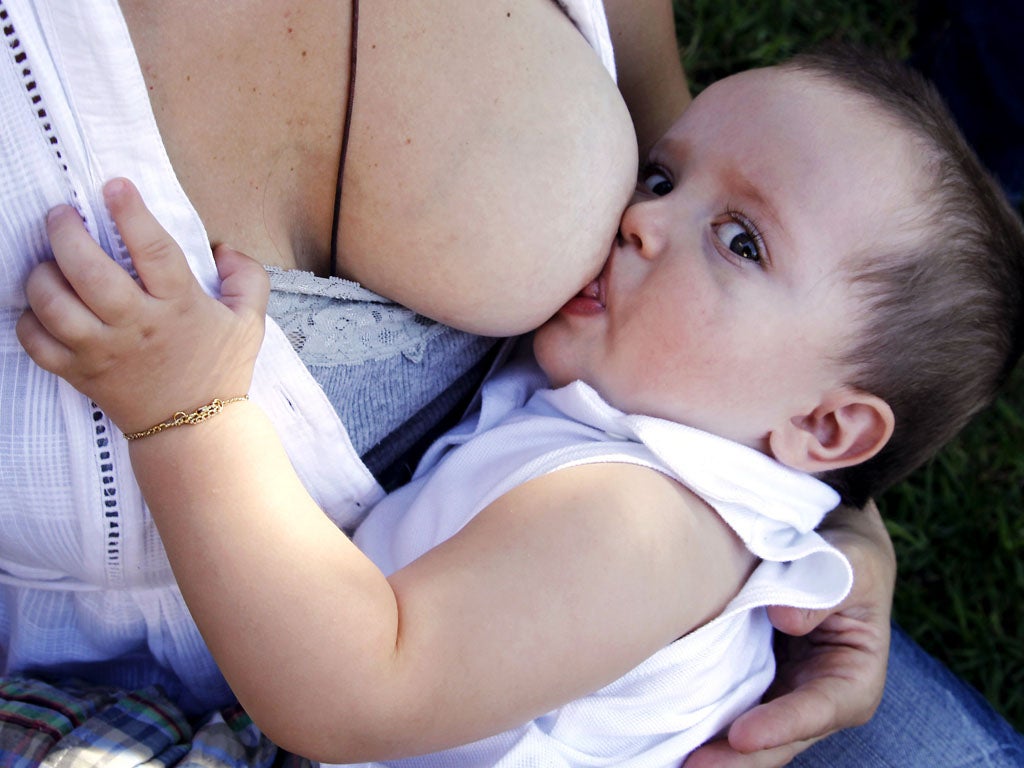The ‘breast is best’ debate: What is it that makes people judge new mothers so harshly?
Save the Children has called for warnings on formula packaging to remind mothers that Breast is Best - but this would only make stressed mothers feel even more guilty

Oh, breastfeeding.
Has ever a word (or two welded together) divided the parenting community in quite the same way? The on-going formula vs mother’s milk debate – which takes a new twist today as Save the Children calls for warnings covering a third of formula packaging reminding mothers that Breast is Best across the UK and Europe as well as the developing world - has the power to turn otherwise rational, open-minded human beings into taunting, judgemental savages. And you can take it from one who bears the scars.
Last year I wrote a teeny tiny piece for the Independent about my experience of breastfeeding, to accompany a news item about women being ‘pressured’ into breastfeeding. No biggie, I thought. Despite lacking the robust character needed to withstand the tirades of abuse that inevitably ensue whenever a journalist utters anything – no matter how mundane - under the headline ‘Comment’, I thought I’d give it a go. Mine is a pretty average take on the breast vs bottle debate – in a nutshell, breast is generally best, but not always manageable. How much wrath could my vanilla opinion possibly evoke?
Quite a lot, as it happened.
Among a slew of unrepeatable words in reply to what I thought was a calm and reasoned summary of why after eight months of breastfeeding my dearly-beloved (while supplementing with formula to enable my husband to do occasional night-time feeds) I felt I had “done my time”, I was branded “awful” for daring to suggest that breastfeeding was not the right choice for every woman. I explained that for me breastfeeding was worth persevering for - worth the mastitis, the breastfeeding counselling (yes, really), the sleepless nights… But for the hate-mail I received, I might as well have written that after eight months of breastfeeding I ate my baby.
It was not the first time I’d felt a stranger’s wrath through an online comment board but this time it felt distinctly personal. There is something about having a baby that makes people – especially other women – feel they suddenly have a right to judge you based on not very much information at all, which makes no sense at all. Given that motherhood is one of the most challenging and stressful (as well as rewarding, brilliant, yadda yadda) experiences in a woman’s life, you’d think other women might be keen to lend a bit of support. Adjusting to life as a new parent is one time when you definitely don’t need other people to judge you, as you’re sure to be doing plenty of self-annihilation already.
What I hadn’t explained in my piece was the initial shame and self-loathing that accompanied my decision to introduce the odd bottle. It took a caring and thoughtful GP to notice that my self-diagnosed post-natal depression was actually nothing of the sort but simply the result of loop-the-looping hormones combined with extreme tiredness, perpetuated by the fact that I was feeding every two hours. When she suggested introducing a bottle so my husband could do alternate nights giving me the space to sleep, I was stunned.
While there can be no doubt that where possible breast is best, she explained, most important to a baby is confident and thriving parents. If, as in my case, a mother is so exhausted and overwrought as a result of purely breastfeeding that she can no longer function properly, that is no use to any child. If a mother for whatever reason cannot breastfeed – and there are plenty of reasons, not least being unable to produce enough milk or having to go back to work – surely the most important thing is that they we give them our support, because new mothers have enough to stress about already. One thing’s for sure, you can’t make her feel more guilty than she already feels.
It should be made clear that Save the Children’s Superfood for Babies report highlights the importance of colostrum to trigger a baby’s immune system and is aimed at addressing a serious problem of infant death in developing countries. The logic of applying the labelling to all countries including the UK, according to Brendan Cox, director of policy at Save the Children, is in case products are exported to countries where promoting breastfeeding in the initial days and weeks could help save 830,000 lives a year worldwide. But the fact is, such a stark warning on packaging will have an impact on mothers whose children are not at serious risk – and the impact could be significant.
Mother’s guilt is the heaviest of burdens, and with the constant juggling modern motherhood demands there is plenty to feel bad about without being confronted with a blazing reminder of your imperfections every time you reach for the powdered milk.
Join our commenting forum
Join thought-provoking conversations, follow other Independent readers and see their replies
Comments
Bookmark popover
Removed from bookmarks